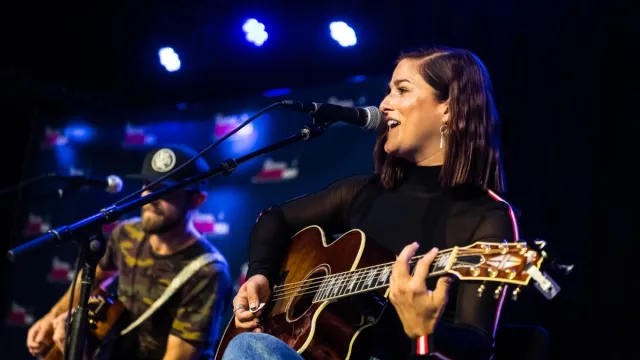“The Voice” Winner Cassadee Pope Quitting Country Music After Being “Ostracized”

Long before she won The Voice in 2012 and subsequently launched a solo career as a country artist, Cassadee Pope was the lead singer of a pop punk band called Hey Monday. Now, after over a decade in the genre favored by her Voice mentor Blake Shelton, the 34-year-old says that she’s going back to her roots, this time on her own. Pope told Rolling Stone in a new interview that she’s chosen to leave country music and return to rock for her next album (due out in the spring), largely because she’s felt “completely ostracized and shamed for speaking out” about her values.
RELATED: Fans Call Blake Shelton an “Embarrassment to Country Music” After Controversial Performance.
Pope became the first woman to win The Voice in Season 3, leading to the release of her 2013 country album Frame by Frame. As a solo artist, she’s also released two more studio albums and three EPs. In 2022, she collaborated with country artist Levi Hummon on the single “RSVP,” which has more of a pop flavor than their other work.
At the time, she told People, “I’m moving away from the country space and going more into pop rock where I came from initially. I’m glad that [‘RSVP’] kind of straddles those lines. It’s a great kind of bridge for me between what I did before and where I’m headed with my next solo project.”
Speaking to Rolling Stone this month, Pope expanded on the reasons why she’s walking away from country.
“I realize every genre has problematic people in it. I’m not saying there’s not a frontman in a band who hasn’t been accused of something in rock music,” she said. “But I guess rock is in my bones more. You’re not completely ostracized and shamed for speaking out.”
Pope told the magazine that she became more politically and socially aware during COVID lockdown, adding, “There’s no good reason for not being aware, but I just wasn’t. I didn’t have any sort of passionate feelings about anything because I was so consumed with myself.”
RELATED: Country Music Station Accused of “Blatant Racism” After Refusing to Play Beyoncé.
After educating herself on issues including systemic racism and transphobia, Pope felt compelled to speak out when beauty influencer Brittany Aldean, wife of “Try That in a Small Town” singer Jason Aldean, made a transphobic social media post.
“I’d really like to thank my parents for not changing my gender when I went through my tomboy phase. I love this girly life,” Aldean wrote.
Pope shared her response on X (formerly Twitter): “You’d think celebs with beauty brands would see the positives in including LGBTQ+ people in their messaging. But instead here we are, hearing someone compare their ‘tomboy phase’ to someone wanting to transition. Real nice.”
“My Church” singer Maren Morris replied to Pope’s tweet in agreement, saying, “It’s so easy to, like, not be a scumbag human? Sell your clip-ins and zip it, Insurrection Barbie”—a comment that infamously led to a feud with Tucker Carlson and thousands of dollars in t-shirt sales.
Rolling Stone notes that Morris and Pope both received death threats for their remarks and did not feel supported by the country community. (Morris has also announced that she’s leaving country music.) Still, Pope has no regrets for calling Aldean out.
“In that moment, I felt so proud,” the star said. “I had no feeling of regret. I just kept my head down and kept going.”
The “Wasting All These Tears” singer also told the magazine that she became frustrated by the steps it took to get airplay on country radio, including to buddying up to DJs and programmers.
“I was so dedicated and determined to get in nice with everyone,” she said. “Some people I genuinely liked, but others I was tipped off that, ‘Oh, this person expects a friendship or some sort of communication, so if you don’t give it to them, they’re probably not going to play you on the radio.'”
On top of that, Pope felt stifled by what she sees as sexism in the genre, from the gender imbalance in radio presence to the response to women artists singing about anything deemed inappropriate. The judgment inherent in that brought back memories of her Catholic upbringing.
“Getting caught kissing in the hallways or discovering masturbation and being shamed for it cemented in me that sexuality and sex and being in touch with that side of yourself was painful,” the artist said. “Leaving a genre where you don’t really hear women singing about that kind of thing, or, God forbid, they wear something scandalous, it just felt really fresh and exciting.”